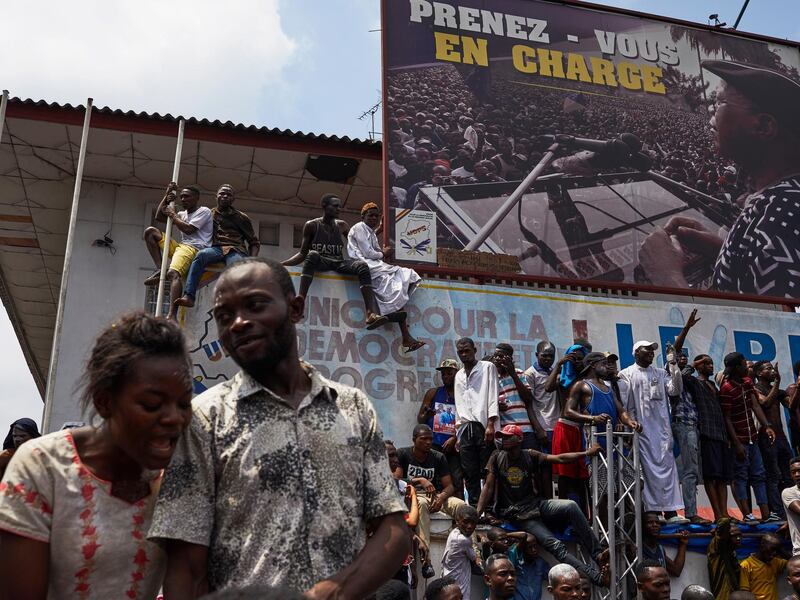Hundreds of supporters of spurned Congo opposition candidate Martin Fayulu gathered in the capital on Friday to denounce what they called “the people’s stolen victory” in the presidential election.
A heavy police presence was on hand as Mr Fayulu was expected to speak. A businessman and vocal campaigner against Congo’s widespread corruption, Mr Fayulu accuses outgoing president Joseph Kabila of making a backroom deal with the surprise declared winner, largely untested opposition leader Felix Tshisekedi.
Mr Fayulu has two days from the election announcement early Thursday to file a court challenge. The influential Catholic Church, the rare authority that many Congolese find trustworthy, says its 40,000 election observers found a different winner, and diplomats briefed on its findings say Mr Fayulu easily won.
_______________
Read more:
Opposition leader Felix Tshisekedi wins DRC presidential poll
_______________
Congolese now face the extraordinary situation of an election allegedly rigged in favour of the opposition after Mr Kabila’s ruling party candidate, Emmanuel Ramazani Shadary, did poorly in the polls.
“Change cannot be negotiated behind closed doors and power only comes from the ballot, there is no other way,” said student Jean Otaba, 28. “You can see there is no massive celebration despite the announcement. That’s because it is not the truth.”
This could be Congo’s first peaceful, democratic transfer of power since independence in 1960, but observers have warned that a court challenge to the results could spin the long-troubled country into chaos. Some Fayulu supporters worried that the constitutional court could invalidate the election results, keeping Mr Kabila in power until a new vote.
As night fell on Thursday, scores of police with automatic rifles and tear gas launchers were positioned along a road in Kinshasa leading to the Kingabwa neighborhood, a Fayulu stronghold. Elsewhere, the nation of 80 million has remained largely calm, though police said three people were killed in Kikwit city on Thursday as people protested the results. Some students protested in the city of Mbandaka on Friday.
Internet service in Congo, cut off the day after the December 30 vote, had not yet been restored.
Careful statements by the international community have not congratulated Mr Tshisekedi, merely taking note of official results and urging peace and stability in a country with little of it. The United Nations Security Council was set to discuss Congo on Friday after officials with France, Belgium and Britain raised concerns.
In a statement overnight, the United States said that “we await clarification of questions which have been raised regarding the electoral count” and it warned against violence.
“Imperfect elections which guarantee post-election stability are getting more accepted than credible elections that result in refusal of power transfer and conflict!” Arnold Tsunga, Africa director with the International Commission of Jurists rights group, mused on Twitter on Friday.
Mr Tshisekedi, who received 38 percent of the vote according to official results, had not been widely considered the leading candidate. Long in the shadow of his father, the late opposition leader Etienne Tshisekedi, he startled Congo last year by breaking away from the opposition’s unity candidate, Mr Fayulu, to stand on his own.
Mr Fayulu, a former Exxon manager and Kinshasa lawmaker, received 34 percent of the vote in the official results. He was a vocal activist during the turbulent two-year delay in Congo’s election, insisting it was time for Mr Kabila to go as many feared the president would find a way to stay in office and protect his vast assets obtained from Congo’s staggering mineral wealth.
Mr Fayulu was backed by two popular opposition leaders barred by the government from running.
The difference between Tshisekedi and Fayulu in official results was some 684,000 votes. Some observers said the 1 million voters who were barred at the last minute, with Congo’s electoral commission blaming a deadly Ebola virus outbreak, could have made the difference. Elsewhere, election observers reported numerous problems including malfunctioning voting machines and polling stations that opened hours late.





